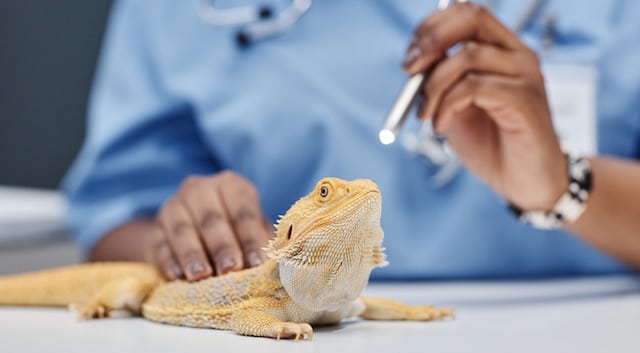
Introduction to Bearded Dragon Impaction
Have you ever noticed that your beloved bearded dragon isn’t pooping like they used to? Or maybe they’re showing signs of discomfort? It could be impaction!
Impaction is a severe condition of reptiles, especially bearded dragons, and it’s essential to know the causes, symptoms, and treatments to keep your pet healthy. In this guide, we will cover everything there is to know about impaction in bearded dragons.
What is Impaction in Bearded Dragons?
Impaction is the blockage of the digestive tract by a hard mass, impeding normal excretion of solid waste. It most often occurs when a reptile ingests a substrate such as sand or gravel, which can get stuck in their gut and form an impaction.
Impaction is not exclusive to bearded dragons, but it is prevalent in this species due to their tendency to dig and explore their environment with their mouths. Bearded dragons who live in an unclean or improperly set up habitat or suffer from neglect are most likely to be impacted. If you suspect your bearded dragon is impacted, examining the root cause is important. There are three leading causes of impaction in bearded dragons:
Causes of Impaction in Bearded Dragons
Ingestion of Loose Substrate
The substrate is the material that covers the bottom of your bearded dragon’s tank. If this substrate is loose and too small — like sand, gravel, or pebbles — your bearded dragon can accidentally ingest it. This is one of the most common causes of impaction in bearded dragons. For this reason, fixed substrates — like reptile carpet and ceramic tile — are recommended for bearded dragons.
Incorrect Enclosure Temperature
Incorrect temperatures and UV levels in the habitat are another common cause of impaction. Bearded dragons require specific temperatures for their basking spot (around 95-105°F) and also need full-spectrum UVB light. Temperature and UVB light are essential for maintaining normal digestive function. If these are not optimal, it can lead to impaction.
Poor Diet
Improper diets can also contribute to impaction. Feeding your bearded dragon too much food or pieces too large to digest can cause impaction. As a general rule, never feed your bearded dragon foods that are wider than the space between their eyes. This is a good guide as it accounts for the fact that an acceptable size of the food will vary depending on the size of your beardie.
Symptoms of Impaction in Bearded Dragons
There are a few signs and symptoms that your bearded dragon might be suffering from impaction. Some of the most common signs and symptoms to watch out for are:
- Not pooping regularly
- Paralysis in hind legs
- Lump in the spinal area
- Loss of appetite
- Lethargy
Bearded Dragon not Pooping
The most common symptom of impaction is a lack of regular pooping. If your bearded dragon is impacted, they won’t be able to pass their waste as usual, and it will start to accumulate in the body. If you haven’t seen any solid waste from your beardie in several days or if there are clear signs of discomfort, it could be suffering from impaction.
Baby bearded dragons should poop one or more times a day. Juveniles (3-12 months old) should be pooping daily. Adult bearded dragons should poop 3–7 times a week. Any deviation from these rates could indicate impaction.
Paralysis in the Back Legs
Impaction can lead to paralysis in the bearded dragon’s back legs due to pressure on the spine. Often, it will appear that your bearded dragon’s back legs seem stiff or weak. This back leg stiffness can cause your bearded dragon to walk with an awkward gait or appear to drag one or both back legs as they move around the enclosure. This is a severe impaction symptom and should be treated as an emergency.
Slight Lump Along the Spinal Area
Another symptom of impaction is a lump or bulge in the bearded dragon’s back. This indicates that their digestive system is backed up, and waste that should be passing through cannot do so.
Loss of Appetite
If impaction is left untreated for too long, it can affect your bearded dragon’s appetite. If impaction is present, your bearded dragon may not want to eat or may be slower than usual in showing interest in food. This is not a tell-tale sign; there are many reasons why a bearded dragon may not want to eat. You should look out for other symptoms besides decreased appetite if you want to be 100% sure impaction is to blame.
Lethargy or Lack of Energy
If you observe lethargy, fatigue, and a general lack of energy, your bearded dragon might be suffering from impaction. If you notice your bearded dragon is more tired and inactive than usual, impaction is a possibility. There are several other causes of lethargy (including normal seasonal brumation), so always check for other impaction symptoms as well.
Impaction Treatment
Once you’re sure your poor beardie is impacted, it’s time to take action. The excellent news is impaction can be treated relatively quickly. You can try several at-home fixes to help your bearded dragon pass the impaction. If at-home treatments don’t work or the impaction is severe, you should take your bearded dragon to a vet.
Habitat, Temperature and Humidity
Impaction can be caused by an unsuitable environment or incorrect temperatures. Temperature is known to affect digestion in lizards. Check your bearded dragon’s enclosure and make sure the temperature is correct (around 95-105°F in the basking spot and 85°F on the cool side).
Another environmental issue that could be causing impaction is a lack of humidity. To promote regular digestion, make sure your bearded dragon’s enclosure is properly humidified to a relative humidity of 30–40%.
Of course, if any impaction-causing objects have been left in the enclosure, it’s essential to remove them immediately. If you use a loose substrate, swap it out with a fixed substrate that won’t cause impaction (like reptile carpet or ceramic tile).
Warm Bath
Giving your bearded dragon a warm bath can help them overcome the impaction. Fill a shallow container with lukewarm water (around 90-95°F) and let your beardie soak for 20 minutes or so, keeping its head above the water at all times. The warmth of the water will relax the muscles and promote impaction passing. After the bath, towel dry your bearded dragon and keep it warm until it returns to its usual energy level.
Massage its Abdomen
Gently massaging your bearded dragon’s abdomen can help shift impaction. Hold your beardie upright and support them in place with one hand. With the other hand, press lightly to massage from the shoulder area towards the tail area of their body. Be gentle, as impaction can cause pain, and you don’t want to hurt them further.
A gentle massage can be enough to work the impaction loose. If this happens, your bearded dragon should expel the impaction immediately. Depending on how long your beardie has been impacted, there might be a voluminous amount of fecal material.
Bearded Dragon Impaction Prevention
Ensure your beardie eats plenty of fresh vegetables and insects as part of their balanced diet. Bearded dragons are omnivores, meaning they need meat-based proteins and plant-based fiber to stay healthy. Avoid giving your bearded dragon any foods that are too large to consume safely. Stick to pieces the size of the space between your beardie’s eyes or less. Also, avoid sugary or fatty foods that may be difficult for your bearded dragon to digest.
When to Take Your Bearded Dragon to a Vet
If impaction is severe, it can be life-threatening. If you think your bearded dragon’s impaction is too serious to treat at home or home-based care isn’t working, it’s best to take them to an exotic vet as soon as possible. A vet can help determine if impaction is causing any other health problems and provide medications or surgeries to help. The vet might also recommend an x-ray or ultrasound to understand the impaction better.
Conclusion
Impaction is a common health issue in bearded dragons but can be prevented or treated quickly. It can be caused by environmental issues such as incorrect temperatures, a lack of humidity, dangerous objects left in the enclosure, and unsuitable food. If you suspect your bearded dragon is suffering from impaction, take immediate action! With quick treatment, your bearded dragon can make a full recovery.
Giving your bearded dragon warm baths and massaging its abdomen can help shift impaction. Feeding them a suitable and balanced diet and maintaining a healthy and safe environment are the keys to preventing impaction. If impaction is severe, it’s always best to take your beardie to the vet as soon as possible for proper treatment.



